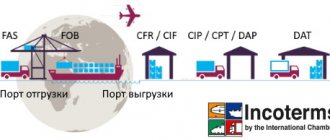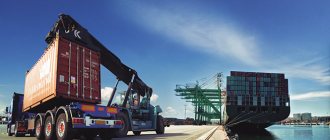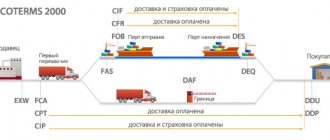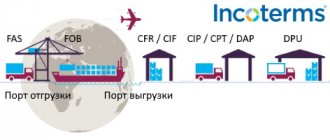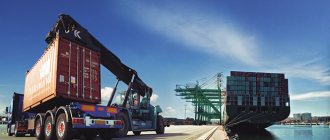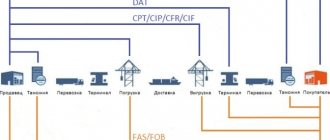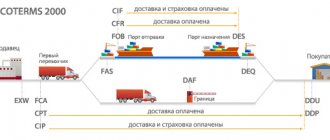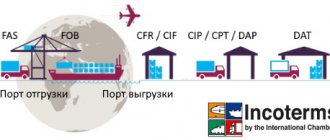After the creation of the International Chamber of Commerce (ICC) in 1919, one of its first initiatives was to promote international trade. In the early 1920s, the ICC attempted to understand the trade terms used by international merchants in their transactions. Studies were conducted in 13 different countries. The findings were published in 1923, in the form of the first six rules using trade terms: FAS, FOB, FOT, FOR, CIF and C&F (CNF), which became the forerunners of the future Incoterms rules.
Incoterms 1936 - first edition of the rules
In 1928, a second survey was conducted to examine the discrepancies in some countries identified in the original survey. This time the scope has been expanded to the interpretation of trade terms used in more than 30 countries. Based on the research results, the first version of the Incoterms rules was published in 1936, which included trade terms: FAS, FOB, C&F (CNF), CIF, EXS and EXQ.
Delivery terms FAS Incoterms
Delivery terms FAS Incoterms - meaning “ Free Alongside Ship” means that the seller delivers when the goods are placed along the side of the ship at the berth or lighters at the named port of shipment. The risk of loss or damage to the goods passes from the seller when the goods are placed alongside the vessel, from which point the buyer bears all costs.
Delivery terms FOB
Delivery terms FOB Incoterms - meaning “Free On Board” (translation of “ Free on Board” ) means that the seller made delivery when the goods passed the ship's rail (on board the ship) at the specified port of shipment. The risk of loss or damage to the goods passes from the seller when the goods are on board the vessel, from which point the buyer bears all costs.
Delivery terms C&F (CNF)
Delivery terms C&F (CNF) Incoterms - "Carriage and Freight" means that the seller has delivered when the goods have passed the ship's rail (on board the ship) at the port of shipment. The seller must pay the carriage and freight necessary to deliver the goods to the named port of destination, and the risk of loss or damage to the goods, as well as any additional costs, passes from the seller to the buyer once the goods are placed on board the ship at the port of shipment. The term C&F (CNF) (Carriage and Freight) later grew into the delivery basis CFR (Cost and Freight).
Delivery terms CIF
Delivery terms CIF Incoterms - meaning “ Carriage, Insurance and Freight” means that the seller has made delivery when the goods have passed the ship's rail (on board the ship) at the port of shipment. The seller must pay transportation, insurance and freight necessary to deliver the goods to the named port of destination, but the risk of loss or damage to the goods, as well as any additional costs incurred after the goods have been shipped, pass from the seller to the buyer. The CIF term "Carriage, Insurance and Freight" later developed into the delivery basis "Cost, Insurance and Freight" .
Delivery terms EXS
Delivery terms EXS Incoterms - decoding "Ex Ship" - (translation " Ex Ship" ) means that the seller is considered to have fulfilled his delivery obligations when he makes the goods available to the buyer on board the ship at the port of destination. The seller bears all risks and expenses associated with the delivery of the goods to the port of destination. The term EXS (Ex Ship) later developed into the delivery basis DES (Delivered Ex Ship).
Delivery terms EXQ
Delivery terms EXQ Incoterms - decoding "Ex Quay" - (translation of Ex Quay" literally "From the quay" ) means that the seller is considered to have fulfilled his delivery obligations when he makes the goods available to the buyer at the quay at the port of destination. The seller bears all risks and expenses associated with the delivery of the goods to the pier at the port of destination, including payment of freight, unloading of the goods, with subsequent placement of the goods on the pier, as well as payment of duties, taxes and fees as agreed. The term EXQ (Ex Quay) later developed into the DEQ (Delivered Ex Quay) delivery basis. There were two types of EXQ delivery conditions: - Ex quay duties paid (from the pier, duty paid) the seller is obliged to perform import customs clearance; — Ex quay duties buyer's account (from the pier, duty at the buyer's expense). The trading terms of delivery associated with the carriage of goods in the first edition of Incoterms were focused mainly on maritime modes of transport.
Group "F" terms
The main transportation is not paid by the seller , i.e. The seller places the goods at the disposal of a carrier provided by the buyer.
- FCA (Free Carrier) – free carrier. The seller delivers the goods, cleared for export, to the carrier specified by the buyer to the named place. The choice of delivery location affects loading and unloading. If delivery is made at the seller's premises, he is responsible for loading. If to another place, the seller is not responsible for loading.
- FAS (Free Alongside Ship) - freely along the side of the ship. The seller delivers when the goods are placed alongside the ship at the berth at the named port of shipment. The seller is responsible for clearing the goods through customs for export.
- FOB (Free on Board) - free on board. The seller is deemed to have made delivery when the goods have passed the ship's rail at the named port of shipment.
Incoterms 1953
Due to World War II, further revisions of the Incoterms rules were suspended and were not resumed until the 1950s. The first revision of the Incoterms rules was published in 1953. It debuted three new trading terms of delivery for non-ocean shipments: FOT, FOR, DCP.
Delivery terms FOT
Delivery conditions FOT Incoterms - decoding “Free on Truck” (translation of “ Free on Truck” ) means that the seller is obliged to pay the costs associated with the delivery of the goods and its loading into the truck. The buyer assumes all risks of loss or damage to the goods, as well as other subsequent transportation costs after loading the goods onto the road transport.
Terms of delivery FOR
Delivery conditions FOR Incoterms - decoding “Free on Rail” (translation of “Franco railway station” literally “Free on the railway” ) means that the seller is obliged to pay the costs associated with the delivery of the goods to the railway station and its loading into the railway car (platform) . The buyer assumes all risks of loss or damage to the goods, as well as other subsequent transportation costs after loading the goods onto rail transport.
DCP delivery terms
Delivery terms DCP Incoterms - decoding “Delivered Costs Paid” (translation “Delivery paid” ) means that the seller is obliged to pay the costs associated with the transportation of the goods, and the buyer assumes all risks of loss or damage to the goods, as well as other costs after the transfer of the goods the seller to the carrier, and not when the goods reach their destination. The term DCP (Delivered Costs Paid) later developed into the delivery basis CPT (Carriage Paid To).
>
Differences between Incoterms 2010 and Incoterms 2000
In the 2010 edition of Incoterms, the number of terms was reduced from 13 to 11. Two new terms were introduced that can be used regardless of the agreed mode of transport, namely: DAT (Delivered at Terminal) and DAP (Delivered at Destination), these terms replaced the previously adopted DAF (Delivered at Frontier), DES (Delivered Ex Ship), DEQ (Delivered Ex Quay) and DDU (Delivered Duty Free).
Incoterms 2010 also states that the rules can be used both in contracts for the international sale of goods and in domestic sales contracts.
Incoterms 1967
In 1967, additional trade terms were added for delivery at border (DAF) and delivery at destination (DDP).
DAF delivery terms
Delivery terms DAF Incoterms - decoding “Delivered At Frontier” named place (translation of “Deliver to the border” name of the place of delivery) means that the seller is considered to have fulfilled his obligations when the goods are made available to the buyer unloaded on an arriving vehicle at the agreed destination on the border.
Delivery terms DDP
Delivery terms DDP Incoterms - decoding “Delivered Duty Paid” (translation of Delivered Duty Paid” - specified name of the place of destination) means that the seller will provide the goods ready for unloading from the arriving vehicle at the disposal of the buyer at the specified destination. The seller must bear all costs and risks associated with transporting the goods, including any duties, taxes and charges for export and import into the destination country.
Trade terms used in Incoterms
EXW
Ex Works – “Franko Zavod”
A popular term that can be simply called “pickup”. The seller makes the goods available to the buyer at his premises - a warehouse, factory or other agreed location. The seller is not responsible for loading the goods onto the vehicle, as well as for customs clearance of the goods for export.
FCA
Free Carrier - "Franco Carrier"
The seller transfers the goods to the carrier or other person chosen by the buyer. The transfer takes place at the seller's premises or other previously agreed upon locations. At the place of delivery all risks pass to the buyer.
CPT
Carriage Paidto - “Carriage paid to”
The transfer of cargo by the seller to the carrier or other person nominated by the seller is carried out at the place agreed upon by the parties. The seller draws up a contract of carriage and bears the costs associated with delivering the goods to the agreed location.
C.I.P.
Carriageand Insurance Paidto - “Freight/carriage and insurance paid to”
Responsibility passes from the seller to the buyer at the arrival terminal, with freight paid by the seller. In addition to transportation, the seller is responsible for cargo insurance, all customs formalities and export costs. However, the seller is not required to complete import customs formalities, pay import duties or perform other import customs formalities.
DAT
Delivered at Terminal - “Delivery at the terminal”
Using this term to conclude transactions is beneficial for the buyer whose warehouses are located next to the import terminal. The term establishes that the seller is obliged to deliver only when the goods, which have been unloaded from the arriving vehicle, are made available to the buyers at the named port terminal agreed upon by the parties. This terminal means any place: an air, railway or automobile terminal, a container yard, a warehouse or a pier. The risk of loss and damage to the goods is removed from the seller upon delivery and unloading at the terminal at the agreed destination. The buyer, in turn, completes customs formalities for the import of goods and pays the necessary taxes and duties.
DAP
Delivere dat Place - “Delivery at the destination”
The term means that the seller delivers when the goods are delivered to the buyer at a place previously agreed upon by the parties. The risks associated with cargo transportation lie with the seller.
DDP
Delivered Duty Paid
The term means that the delivery made by sellers when the goods, cleared of customs duties required for import, are made available to buyers by vehicle. Sellers are responsible for the risks and costs associated with transporting goods to their destination. They must complete customs formalities arising during the export and import of goods and pay the necessary fees.
Rules for sea or inland (river) water transport:
F.A.S.
Free Alongside Ship - “Free along the side of the ship”
The term means that the seller will be deemed to have fulfilled his obligations to deliver when he places the goods alongside the vessel (i.e. on a barge or quay) nominated by the buyer at the agreed port. At the same moment, risks transfer from the seller to the buyer.
FOB
Freeon Board - “Free on Board”
The seller delivers the goods on board the vessel nominated by the buyer at a pre-agreed port of shipment, or causes the goods to be so provided. When the goods are on board the ship, the risk for damage or loss of the goods passes from the seller to the buyer. From the moment of full loading on board the vessel, the risks pass to the buyer.
CFR
Cost and Freight - “Cost and freight”
The seller undertakes to deliver the goods on board the vessel or make the goods available in this manner. Once the goods are on the ship, the risks for damage or loss of the goods are transferred to the buyer. Freight and expenses associated with delivering the goods to the agreed port are paid by the seller.
CIF
Cost Insuranceand Freight - “Cost, insurance and freight”
The term means that the seller undertakes to deliver the goods on board the ship. When the goods are loaded onto a ship, the risk of damage or loss of the goods passes to the buyer. Freight and expenses required to transport the goods to the port of destination are paid by the seller who entered into the contract. In addition, he draws up an insurance contract that will cover all kinds of risks for damage to the goods during transportation.
Delivery terms FRC Incoterms 1980
Due to the increase in various methods of delivering international goods: road transport, air transport, rail transport, container, ferry, pipeline transport, the trade term FRC (Free Carrier) was introduced in 1980, which provided for the transfer of goods not on board the transport, but on land ( for example: in a port, in a container terminal). The FRC terms of delivery have effectively replaced the terms FOT, FOR and FOB Airport, as it allows the use of any mode of transport.
Delivery terms FRC Incoterms - decoding “Free Carrier” (translation of “Free Carrier” literally “Free Carrier” specified name of place) means that the seller will transfer the goods to the specified carrier at the named place. The term "Free Carrier", first introduced in the 1980 version, became the abbreviated FRC, which would later be renamed the FCA (Free Carrier) delivery basis.
All changes to the Incoterms rules from 1953 to 1980 were only amendments in the form of adding new terms to the existing Incoterms rules, and it was only in the late 1980s that the International Chamber of Commerce revised Incoterms and adapted them to modern commercial practice.
Current use of FOR/FOT delivery bases
When delivering products internationally, the buyer and seller can interact according to the scheme that is most convenient and acceptable to them.
The International Chamber of Commerce (ICC), which develops and updates the international delivery terms of Incoterms, does not prohibit the use of old versions of the rules: 2000, 1990 or any others.
However, according to Order of the Federal Customs Service of the Russian Federation No. 1003 of 2007 (as amended in 2021), Appendix 19 provides only the delivery conditions indicated in the version of the Incoterms 2000 rules.
The situation is similar with filling out the declaration. The Decision of the Customs Union Commission No. 257 (dated 2010, as amended in 2019) is in force on the territory of the Russian Federation. The Classifier of Delivery Conditions for this Decision provides more current bases - Incoterms 2010.
And if none of the given bases corresponds to the conditions specified in the contract, when drawing up a declaration, the parties can indicate and describe their conditions as “other delivery conditions.”
Please note that FOT/FOR conditions can easily be replaced by FCA. They are more versatile.
Incoterms 1990
The 1990 edition of Incoterms changed the abbreviation " FRC " for "Free Carrier" to " FCA ".
Since it was now possible to use one general FCA term for any type of transport, the trading conditions FOR, FOT and FOB Airport were considered obsolete and were removed. It has also become possible to use electronic messages more widely: instead of paper documents, provide EDI messages if the parties have agreed on an electronic method of communication. The 1990 edition of Incoterms had 13 separate supply bases
| EXW | Ex Works (...named place) Franco plant (...name of place) |
| FCA | Free Carrier (...named place) |
| F.A.S. | Free Alongside Ship (... named port of shipment) Free along the side of the ship (... name of the port of shipment) |
| FOB | Free On Board (... named port of shipment) Free On Board (... name of the port of shipment) |
| CFR | Cost and Freight (... named port of destination) |
| CIF | Cost, Insurance and Freight (... named port of destination) |
| C.I.P. | Carriage and Insurance Paid To (... named place of destination) Freight/carriage and insurance paid to (... name of destination) |
| CPT | Carriage Paid To (... named place of destination) |
| DAF | Delivered At Frontier (... named place) Delivery to the border (... name of the place of delivery) |
| DES | Delivered Ex Ship (... named port of destination) Delivery from the vessel (... name of the port of destination) |
| DEQ | Delivered Ex Quay (... named port of destination) Delivery from the pier (... name of the port of destination) |
| DDU | Delivered Duty Unpaid (... named place of destination) Delivery without payment of duty (... name of destination) |
| DDP | Delivered Duty Paid (... named place of destination) |
Group C terms
The main transportation is paid by the seller , i.e. the seller enters into a transportation contract and sends the goods to the buyer, but does not bear the risks associated with loss and damage to the goods).
- CFA (Cost of Freight) – cost and freight. The term means that the seller has made delivery when the goods pass the ship's rail at the port of shipment. The seller pays expenses and freight (carriage charges) necessary to bring the goods to the named port of destination, but the risk of loss and damage to the goods occurring after shipment passes from the seller to the buyer. The seller is required to clear customs for export. This term is used when transporting by water.
- CIF (Cost Insurance and Freight) – cost, insurance and freight. The seller is also (except as in the previous term) obliged to provide insurance of the goods in favor of the buyer. Incoterms provide for insurance with minimum coverage. If the parties want to provide for extended insurance, then this must be provided for in an additional agreement.
- CPT (Carriage Paid To) - the seller delivers the goods to the carrier at the specified destination and pays transportation costs. But the risks of loss or damage to the goods from the moment of shipment are transferred to the buyer
- CIP (Carriage and Insurance Paid To) - carriage and insurance paid to.
Incoterms 2021
On 10 September 2021, the latest ninth edition of the Incoterms 2021 rules was published and came into force on 1 January 2021 (ICC Edition No. 723).
The main changes in the new rules of Incoterms 2021 (Incoterms 2020): The term DAT has been renamed to the delivery condition DPU of Incoterms 2020 and now the goods can be unloaded at any agreed location. Changes in FCA delivery conditions - you can now require the transfer of the bill of lading to the seller. Change in the level of insurance coverage for the CIP delivery condition - increase from minimum to maximum insurance coverage against all risks. Transportation of goods can now be carried out using the buyer’s and seller’s own transport. Inclusion of safety requirements in obligations and expenses for transportation and customs clearance of goods. Incoterms 2020 is the latest version of the rules, which will be in force for a decade, until 2030. The next revision of Incoterms rules will be in 2029.
Basic terms of delivery that are not included in the Incoterms rules, but are used in connection with established historical traditions: FIW (Free into wagon - Free wagon) - used for rail transportation, the seller is obliged to order wagons (platforms) in a timely manner and at his own expense, and load them into them goods, notify the buyer about the arrival date, provide transport documents. The buyer bears the costs associated with the transportation of goods and the risk from the moment the goods are transferred to the railway (or forwarder). The term FIW is one of the variants of the FOR basis. FIB (Free into barge/lighter) the seller is obliged to order a barge and load the goods in a timely manner and at his own expense. FIP (Free in pipe - Franco pipeline) the seller is obliged to deliver the goods to the pipeline at his own expense. FOD (Free on dock) The seller pays for the delivery of goods to the loading platform, and the buyer organizes and pays for the loading and dispatch of the goods. FP (Free port) - the seller is obliged to deliver the goods to the port. FT (Free terminal) the seller is obliged to deliver the goods to the terminal. FFB (Free ferry berth) the seller is obliged to order a ferry in a timely manner and at his own expense, deliver the goods and load it on the ferry. FRRB (Free roll on/roil off berth) the seller is obliged to deliver the goods to the ro-ro berth for dispatch to the destination by the berth administration via the ro-ro line. FIT (Free in tank) is used in the oil market.


